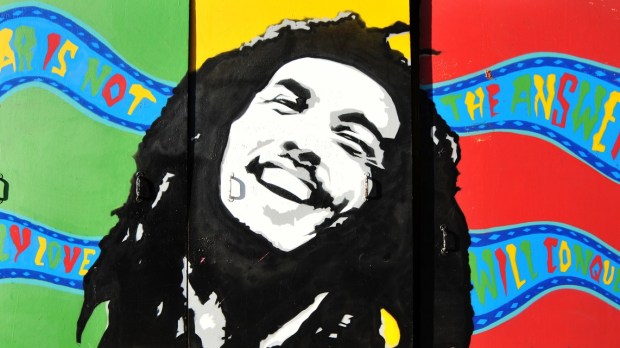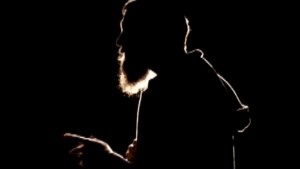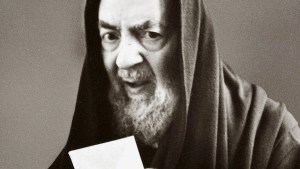The baptism of the reggae superstar and face of the Rastafarian movement into the Ethiopian Orthodox Church is a true story—but also, for the most part, an untold one. His official biographies acknowledge that it happened, but offer very little detail. The 2012 documentary Marley makes no mention of it whatsoever. Unless you were to stumble on this story online—as I did when an Ethiopian Orthodox friend shared it on Twitter, or perhaps as you are doing now with this article—you would likely never hear about it at all.
Bob Marley was born on February 6, 1945, in the village of Nine Mile in Saint Ann Parish, Jamaica. His father, Norval Marley, was a white man of English origin who died when Marley was 10. His mother, Cedella Booker, was a Black woman of Afro-Jamaican descent. In her book Bob Marley, My Son, Marley’s mother notes that, before conceiving Bob, she “caught religion” at Shiloh Apostolic Church, a Pentecostal church in Kingston where she was a chorister.
Christian influence
Marley was influenced by this Christian environment growing up, particularly through song. In Chanting Down Babylon, Roger Steffens quotes Cedella as saying that, around the house, Marley “would always sing along with me, hymns, popular songs, whatever.”
Marley began recording music in 1963 with The Teenagers, who later rebranded themselves The Wailers. Much of his early music—including “One Love” (an earlier version of one of his well-known songs)—reflect an immersion in Scripture that would continue throughout his life and work. In The Bible and Bob Marley, Dean MacNeil identified no less than 137 distinct biblical references, largely from Psalms and Proverbs, in his Island Records era.
MacNeil writes:
Biblical references and imagery pervade Marley’s music, from “Judge Not,” his first published song at age 17 (based on Matthew 7:1/Luke 6:37), to “Redemption Song,” the last track of his final album before he died of cancer at age 36 (“How long shall they kill our prophets while we stand aside and look? / Some say it’s just a part of it, we’ve got to fulfill the book,” cf. Matt. 23:37/Luke 13:34). He even said the name of his group derived from the “weeping and wailing” found in the Bible, likely referring to Jeremiah 9:10, a lament over the Babylonian conquest of Judah. He read daily from the King James Version.
Rastafarianism
While his interest in Scripture never faded, by late 1966, Marley slowly but surely began to immerse himself in the Rastafarian view of “Jah,” the Bible, and history. Rastafarianism—reduced in pop culture to cannabis and dreadlocks—rejected oppression and colonialism (“Babylon”) and embraced African heritage and history (“Zion”). And at the heart of the Rastafarian faith was the belief that Haile Selassie (or “Ras Tafari”), the Emperor of Ethiopia, was God incarnate and the second coming of Jesus.
In February of that year, Marley had married Rita Anderson, a Christian who converted to Rastafarianism that April when Selassie visited Jamaica. Marley eventually followed suit, joining the Twelve Tribes of Israel—known, as Dean MacNeil notes, as “the most ‘Christian’ and Bible-based sect of Rastafari.” He recorded his first Rastafarian-influenced song, “Selassie Is the Chapel,” in June 1968, followed by another, “Jah Is Mighty,” in 1970.
The decade of musical stardom that followed for Marley the Rastafarian is well known. But in 1980—three years after his initial cancer diagnosis, and just months before he died—Marley embarked on another, more hidden revolution. In the biography Catch a Fire, Timothy White notes that Marley had returned to Sloan-Kettering in New York after trips to Miami and Mexico. It was during that visit to New York, on November 4, 1980, that he was baptized. “Rita had Bob baptized in the Ethiopian Orthodox Church. …. Taking the name Berhane Selassie [“Light of the Trinity”], he had become a Christian Rasta.”
We learn a few more details in a 1988 biography by Stephen Davis: the exact location of the baptism was the Wellington Hotel in midtown Manhattan. Archbishop Abuna Yesehaq—a leader of the Ethiopian Orthodox Church sent to minister to Jamaicans—is the one who baptized Bob. “A tearful Rita” and their children were present too.
Christian funeral
Marley’s funeral was a thoroughly Christian celebration—further confirmation of his departure from Rastafarianism (which generally doesn’t observe funeral rites at all) and reception into the Orthodox Church. The Guardian offers an extensive summary of the entire event, also reflected in video footage online. Aside from the occasional nod to Rastafarianism, the event was deeply rooted in Christian song, readings, and prayer—all in a way that was respectful of the great themes of Marley’s life and work.
Was Marley’s conversion authentic? White implies that the idea was Rita’s, and that Marley remained, at heart, a Rasta. Davis acknowledges that Marley may have been attracted to the ancient authority and mystery of the Ethiopian Church—but also wonders if the Baptism stemmed from Marley’s fear of death or a desire to please his mother, who had “been trying for years to bring him back to Christianity.”
But the eyewitness accounts of those closest to Marley and his conversion are telling. In So Much Things to Say: The Oral History of Bob Marley, Archbishop Abuna Yesehaq, the man who baptized Marley himself, reflects:
“Bob was really a good brother, a child of God, regardless of how people look at him. He had a desire to be baptized long ago, but there were people close to him who controlled him and who were aligned to a different aspect of Rastafari. But he came to church regularly. I remember once while I was conducting the Mass, I looked at Bob and tears were streaming down his face.
“When he toured Los Angeles and New York and England, he preached the Orthodox faith, and many members in those cities came to the church because of Bob. Many people think he was baptized because he knew he was dying, but that is not so. He did it when there was no longer any pressure on him, and when he was baptized he hugged his family and wept, they all wept together for about half an hour.”
In an interview, Yesehaq—who also reflects on the close similarities between Ethiopian Orthodox and Roman Catholics—reiterates that Marley cried for a half hour when he was baptized, adding that he interpreted it as tears of repentance. He also adds that Marley’s wife Rita and their children were baptized into the Orthodox faith in 1973—seven years before Marley. (In The First Rasta, Davis highlights another aspect of Marley’s long-running connection to the Orthodox Church: “He had been its secret benefactor in Jamaica for years, financing the construction of its church on Maxfield Avenue.”)
Another missionary to Jamaica from Ethiopia, Liq Kahnat Misale, lived in Bob Marley’s house “for four years” and confirms Yesehaq’s reading in a quote in Visions of Zion: “Bob Marley’s children would come to church and serve the diaconate. I think that Bob Marley was a true Orthodox believer, but he didn’t come out with that.”
More powerful still is the testimony of Rita herself. According to her, this wasn’t something she arranged for Bob; it was something he arranged for himself. In No Woman, No Cry, she writes, “The morning of November 4, 1980, he called for a baptism. I’d been telling him to be baptized ever since His Majesty Haile Selassie sent Abba to Jamaica, because I’d had all our children (not only my own) baptized in the Ethiopian Orthodox Church. When he asked me to call Abba that morning, he was crying. We were all crying.”
According to Judy Mowatt, Rita’s friend and a former back-up singer for the Wailers, Rita called her when Bob was dying and said he was “in such excruciating pain and he stretched out his hand and said, ‘Jesus take me.’”
Marley, who would have turned 78 on February 6, never announced his conversion, but it happened. And taking all these reports together, it seems clear that it was not only authentic but profound. All of which raises the question: Why does no one want to talk about it? Why has this fascinating turn of events in the life of one of the great legends of music been so consistently downplayed or ignored?
Maybe it was assumed to be false—one of those “death-bed conversion” stories Christians love to tell. But more likely, it never got out much because it was so clearly true—and many friends and fans saw it as an embarrassing endnote that would tarnish his legacy.
Marley’s conversion was not a repudiation of his life; it was a confirmation of what ran deepest in him: his Christian heritage and passionate search for truth and justice. He did not die a Christian Rasta, but a Rasta-turned-Christian. It is time to share, far and wide, the good news of Bob Marley’s conversion, and to hear his songs as they truly were: seeds of the Word preparing his heart—and our own—for the Gospel.



